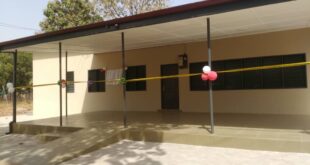
Tamale, Ghana – The Northern Regional Director of the National Commission for Civic Education (NCCE), Alhaji Abdul Razak, has observed that if Ghanas business sector is going to grow then citizens would have to an enabling environment devoid of corruption.
He said the biggest issue currently confronting private sector development is corruption, and as a result, people who have money to invest in the region are scared because of the challenges that they go through whenever they attempt to start their business.
“Over the years the private sector has suffered greatly because of our acts of omission and commission. People have a lot of money they wish to come and invest but the challenges that they go through is too much. Even a paper that you have to send for someone to sign is a problem. And yet we want jobs for our children..”, Alhaji Saani said this when he delivered a keynote speech at a Regional Multi-stakeholder Business Integrity Forum held in Tamale on Monday November 26, 2018.
Organized by the Ghana Integrity Initiative (GII) with funding support from DANIDA, the one-day forum sought to create an avenue for deliberations on challenges faced by the private sector in doing business in Ghana and thereby promote transparency, accountability and business ethics for economic growth and development.

The forum brought together actors in the public sector including Registrar General’s Department, Ghana Revenue Authority, SIC, NBSSI and NCCE among others.
According to him, the NCCE has done a survey on citizens perception on corruption and it is amazing that a greater majority of the respondents (over 70%) see corruption to be among people in high places especially politicians.
“Unless and until we break that problem, unless our citizens recognize the fact that corruption has to do with everything but our lives including even late coming to functions. When a teacher comes to school late, its corruption. When a doctor comes to the hospital late, it’s corruption”, he pointed out.
Alhaji Saani underscored the need for Ghanaians to show commitment to the fight against corruption by exposing people who are corrupt, abusing state resources, engaging in dereliction of official duties, lying to cover up for others who commit crimes or engage in illegalities.
He maintained that the fight against corruption requires a collective action and all citizens must come together to fight the menace which is eating up the nation.

Michael Okai, Coordinator of Advocacy and Legal Advice Centre (ALAC) at GII, said the Ghanaian business environment is constrained and saddled with many challenges, notable amongst he mentioned cumbersome port clearance procedures, long and laborious processes and procedures in setting up businesses, difficulties in obtaining permits and licenses, weak enforcement of standards allowing cheap and substandard goods to enter our markets.
Among all the constraints, he said “corruption is the worse threat to the businesses operating in our economy. Therefore tackling corruption will require the engagement of multiple stakeholders if we are going to make any headway”, he pointed out.
Going forward, Mr. Okai noted that, the GII with support from DANIDA under the expanded Tax and Development Programme would seek to coordinate and facilitate quarterly multi-stakeholder forums amongst business and private sector, state actors and civil society to identify, project and advocate for a corruption free business environment in Ghana.
The quarterly forums would among other things, seek to create an avenue or space for deliberations on challenges faced by the private sector in doing business in Ghana and elicit appropriate state institutions responses and agree on means of addressing identified challenges.

The forums would also create a community of practice for businesses to share their ideas and learn from other companies anti-bribery policies that promote transparent and accountable business practices.
Meanwhile, participants urged the general public stop interfering in the work of law enforcement agencies and rather assist them to do their work well. They also urged parents to stop teaching their children how lie or cheat.
Public and civil servants, they indicated, must also cease all forms of unnecessary bureaucratic practices in their work places which in their view are breeding corruption.
The GII is the local chapter of Transparency International. It is a non-partisan, non-profit civil empowerment organisation focused on the delivery of the essential themes necessary for the creation of a National Integrity System.
By Savannahnewsonline.com/Philip Liebs
 Savannah News Online Reporting Only What Matters Most
Savannah News Online Reporting Only What Matters Most



